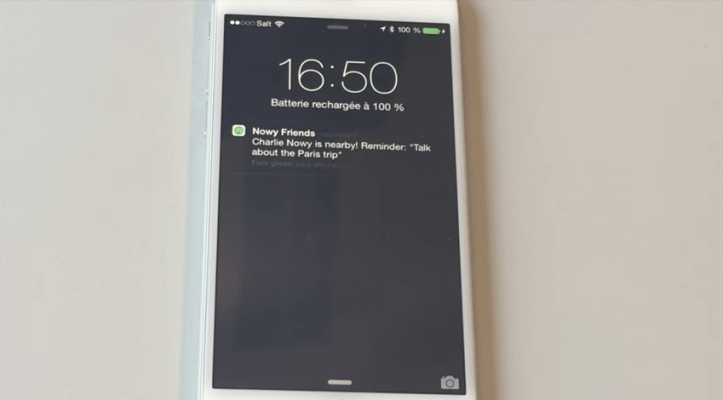A Swiss startup has built a social radar app with a pro-privacy twist: instead of tracking users via GPS, or other location triangulating technologies, the Nowy Friends app uses peer-to-peer proximity to power nearby notifications without storing smartphone users’ location data on its servers.
Currently the app uses Bluetooth Low Energy to power proximity alerts, which supports a range of around 50 meters (and also works offline). So the sorts of scenarios it’s envisaging its app being useful is to help friends serendipitously finding each other on metro trains, or at a party, or in a bar, or a city street.
As well as proximity alerts the app includes a cute person-based reminder feature, which lets users ask it to trigger a custom reminder when they are near the person in question — so the app can help people remember to give back that thing they borrowed, or ask a particular person a certain question, and so on.
The iOS app was soft-launched back in March, with the team only starting to promote it last month — kicking off testing at their alma mater, the EPFL in Lausanne. (They have received an Innogrant from EPFL to help fund development.) The app has between 50 and 100 daily active users right now, with 375 downloads, so it’s certainly very early days. They’re working on building an Android app as one way to grow usage.
Beyond privacy, other advantages of using p2p tech vs GPS are improved location accuracy and lower battery drain, says Nowy Friends’ co-founder Silviu Andrica.
Of course there are plenty of social radar apps on the market already — he names Facebook’s Nearby Friends functionality and apps like 500, Find my Friends, SocialRadar and LetsMeetApp as treading similar ground. But argues using BLE gives Nowy Friends an edge — on privacy, accuracy, battery life and offline usage.
“Current apps store their users’ location information on their servers, which can be hacked. In contrast, Nowy Friends does not upload its users’ location anywhere, because it doesn’t have to,” he notes.
Nowy Friends only currently supports sign in with Facebook. But Andrica says it does not upload any data from users devices to Facebook — so the the new piece of information passed to Facebook is that the user has signed up for the app. Meanwhile it uses Facebook data to authenticate users, make it easier for people to find their friends and prevent non-friends locating them via the app.
As with all network effect apps, Nowy Friends’ usefulness is directional proportional to the number of your friends using the app — so it faces a tough challenge to get its target demographic (of 13- to 32-year-olds) signed up.
If it can build traction, Andrica says the team sees potential to monetize via “proximity advertising” — allowing users to advertise to each other when they have stuff to sell. So sort of like an even more mobile Wallapop then. (He characterizes the concept as “an ultra-localized Craigslist”.)
“Say I want to sell my bike. I can put an ad about it in Nowy Friends. As I go about my day and meet other Nowy Friends users, they’ll get my ad, and if they’re interested, we can meet in person, right then, right there, and do the transaction,” he says.
“We’re also thinking of enabling companies to advertise to Nowy Friends users when they’re nearby. Of course, we’re thinking of ways to minimize the amount of spam one receives. And, we’re thinking of doing this on one’s smartphone, not in the cloud.”
